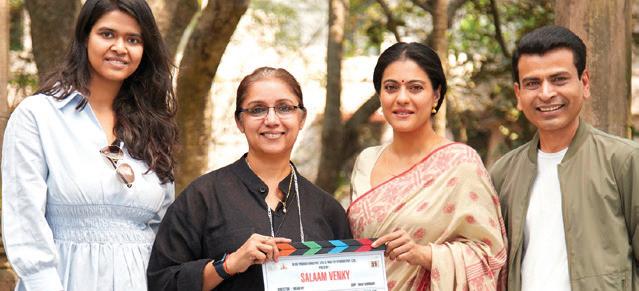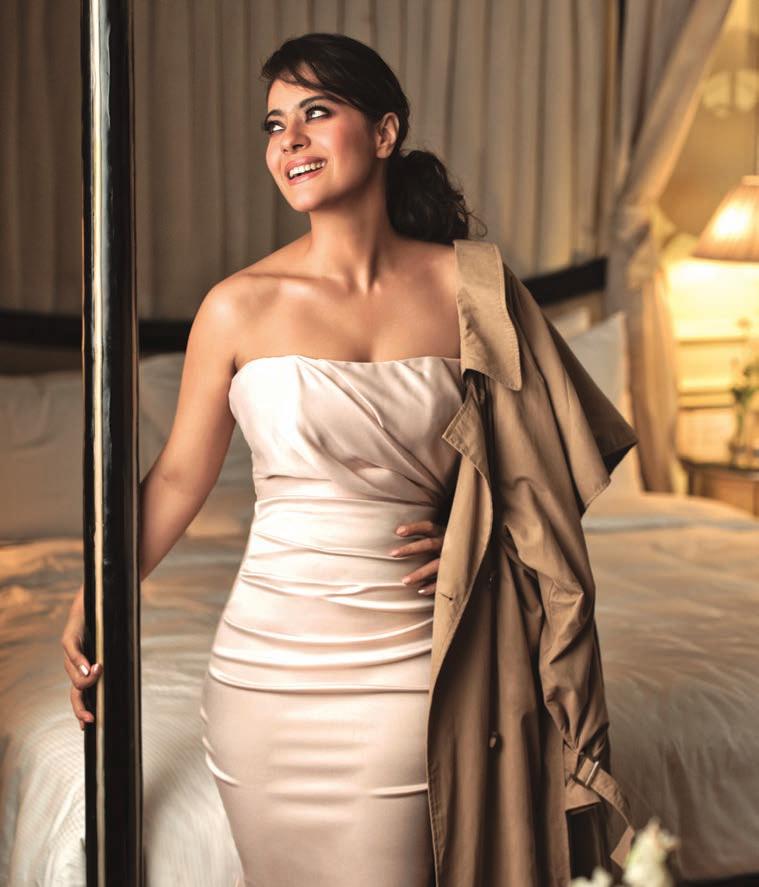
8 minute read
Mom is the word
KAJOL CHATS ABOUT MOTHERHOOD, CAREER AND MORE WITH SUMAN SHARMA
Kajol’s character in her recent film Salaam Venky is inspired by a real life braveheart mother K Sujatha, who lost her son, Kolavennu Venkatesh, to Duchenne Muscular Dystrophy in 2004. He wished to donate his organs before his death and for that, his mother even filed a petition in the Supreme Court for the right to grant him euthanasia. The film is based on his inspiring tale of living your life to the fullest in the face of true adversity. It took a huge amount of emotional toll on Kajol to do the role. She says it’s one of the most satisfying roles of her life. She talks about working with director Revathi, the bond she shares with her kids and mother, what being a mom has taught her, and how she’s in the best phase of her life both personally and professionally. Excerpts:
You have played a sensitive, doting mother several times; how different is it in Salaam Venky?
I have always played a fictional mother, so it’s always been a character that someone’s written. This was actually a real mother, so I had this added responsibility of meeting the person and knowing that she is someone who is there in real life. And that adds a certain amount of responsibility to your shoulders. Then you can’t take too many cinematic liberties in playing that character. That is the main difference between fictional characters and real people.
We’ve heard that you initially didn’t want to do the film.
Yes, I did. When Revathi told me the script of the film, I just said no because I am careful and sensitive about these things that I don’t want to play. I don’t want to watch movies in which anything bad happens to my children because I have two. I told her, “I’ll hear it because you are Revathi, and I respect you greatly but I am not going to do this.” But when she narrated the film to me, I loved it. I knew she was a perfect director because only a person who can understand people would be able to narrate this film with the right amount of sensitivity. I have seen her last film, Phir Milenge, with Salman and Shilpa Shetty. I remember watching that film and thinking, “OMG! What a fabulous film she had made.” It was more about the people than the disease.
What sets Revathi apart as a director?
She has a lovely way of seeing everything through a wider lens, putting it together, and being able to see the entire film way before she actually makes the film. The editing table is where 90 percent of the work is done. Her vision was always clear about what the film was going to look like.
Is it easier to work with a female director?
I would say it is fabulous to work with good directors. The fact that they are females should not matter at all. It is not a matter of gender whether you are a good director or not. So yes, she is a fabulous director. And because she is a woman, we were able to talk a little more and crack a few jokes, which we would not have been able to do if she were a man.
It’s said that no bond in the world compares to that of a mother and child?
I do believe that. The mother-child bond is just like an umbilical cord.
Which never gets cut. If you see Salaam Venky, the mother and son have a lovely scene in it. Venky tells his mother, “You have taken care of me and my whole life. I apologise for putting you through this,” and she turns around and says, “No... are you mad? It’s you who’ve taught me not to just exist but live my life.” I believe children come into our lives to teach us things.
What have you learnt from your kids Yug and Nysa?
I’ve first and foremost learnt patience. One of the biggest things that my son said to me at one point was that you shouldn’t shout at Nysa for telling the truth. And he said this in a very nice way. Hugging and kissing karte hue, meri god mein baithe hue. He said, when you guys ask, “are you okay,” We sometimes lie to you and say we’re fine. The truth is that sometimes we’re not ok. If Nyas’s telling the truth, then you shouldn’t shout at her for that. I said you taught me a great thing today. So many times we say to children, “You have to go out with us,” and they say, “I don’t want to come,” and we fire them. There are a lot of small things where we take them to task. Both my kids have taught me so much. I thank God for them everyday. I am so grateful to God for bringing them into my life.
How different or similar are you as a mother to your own mother, Tanuja?
I am different from my mother. I am not as brave as her. Throughout her life, she has been extremely brave. I am not as forward thinking as her. The things she taught and discussed with me as a child, and most importantly, what I learnt from watching her, have stayed with me. I hope and pray that I have lived my life in such a way that I have taught my children what to do in what circumstances. All of these things are being done in front of you by your mother, grandmother, greatgrandmother and aunt. They leave a mark. It’s liberating for a girl or a woman in today’s society to know that women of that time could achieve so much without backup. They didn’t have the finances that you have today. If they are able to do it, then I should be able to do the double of what they’ve done.
Vishal Jethwa plays your son in Salaam Venky. How did you two bond? As essentially it’s a two-character story?
He is a lovely, well-raised guy, and he actually has a great relationship with his mother. The first thing that he said to me was, “Main apni maa se itna pyar karta hun ki mujhe pata hai ki, agar aisa kuch hota, to meri maa mujhe kaise sambhalti.” I was really touched by that. So I thought this was perfect casting. We got along very well.
Salaam Venky is an emotional story. Was there a point where you got too emotional because we are seeing so many people battle various health issues?
Yes, the film is extremely emotional. We kept having emotional breakdowns. But like I said, Revathi has a lovely way of handling these things. You feel so confident about her. I never felt uncomfortable or unsafe as an actor. I always felt that I was taken care of in that respect.
What are your thoughts on the types of roles you are receiving, as well as the types of roles available to women today?
I think writing has just gotten better. It’s a great thing that writers feel that they have the freedom to write whatever they want. We just don’t need to be actors or directors. Today an actor can become a director or even an interior designer. The whole world is open to us. And I do believe that it is a fantastic time right now, as so many female DOPs are coming in. I like the fact that this was a completely male-dominated industry. We’re getting more female energy, a lot more women are working. It takes a lot to be able to work in a maledominated industry, which was not there earlier. Our industry is probably the only one where we didn’t have as many women but now we have a lot more women, and that is fabulous.
As a woman or as a heroine, have you ever felt unequal to men in terms of money, roles or anything else?

I have never felt unequal to anyone. I’ve always felt on par, if not slightly higher. I am definitely better and more intelligent than 90 percent of the people around me. (Laughs) I believe that at least.
Do you think, as an actor, it’s important to reinvent yourself with each character you play ? I think you have to reinvent yourself in life as well. You have to learn new things. As we take on new roles in life, we must do the same in film. Whatever you felt in real life will be reflected on screen. So, if you are enthusiastic about life and are happy and excited, it will show on the screen. The camera is one of man’s few magical inventions capable of capturing what is truly inside. When you see a film, you know whether the person you are watching on screen is a good person, a bad person, or what kind of person he is. Is he real, or is he not real? You get the feel of the person, and now on social media, par toh, it has become a sabun ka ad -- sab kuch dikhta hai.
Is it a requirement of today’s time to be active on social media?
Yes, it’s today’s requirement. But nowadays, social media accounts have become like your resume, where people are immediately aware of what you’re doing, what you’re wearing. I believe that the existence of social influencers today proves that an entirely new profession has come into existence.
In your profession, you always have to look presentable. Do you get irritated about it sometimes?

Yes, it’s necessary to be presentable in front of the paparazzi. But now I don’t take it that seriously. I don’t believe that I should put so much pressure on myself as an actor, because it’s not good for your mental health. We should like ourselves, and how will you like yourself if you only look at yourself critically. You should be able to say, “Ki abhi main bas jaisi bhi lag rahi hoon, waisi hi nikal kar bahar jaungi.” I do that. I am fine with my body, I am fine with how I look.
Were you always like that? What keeps you grounded?
Like I said, I don’t take myself seriously. If you start taking yourself seriously, then you will have to hold yourself to some utopian standard of perfection. If you hold yourself to that standard, you have to live up to that standard every moment of your day. My peace of mind is important. My time for myself is important. That is something I fight for with everyone. I like my solitude. I just like to sit. I just want to read my book, I want to chill with myself. I think that I am funny personally. (Laughs) I make myself laugh regularly. Main apne aap ko hansati rahti hoon.
You always find happiness in the smallest things...
I think happiness is not a feeling; it’s a choice. I choose to be happy every day of my life. It does not depend on the circumstances. I choose to be happy every moment, and it’s not something that I had before. It’s something that I’ve developed over the past five-six years. I thank my mother for that, because she taught me that you have that choice within you. She turns 79 this year and she is amazing. She is happy; she chooses to be happy every day. n







